The Leibniz-IZW regular publishes press releases on key findings and insights from its research and on events, awards or personalia. The press releases are distributed directly to journalists on our press release distribution mailing list. Press releases are also disseminated through the distribution services Informationsdienst Wissenschaft, AlphaGalileo and EurekAlert. Are you interested in receiving our press releases directly via e-mail? In this case please send us an email to presse@izw-berlin.de.
Current press releases

Mystery of polar bear Knut’s disease finally solved
Knut, the famous polar bear of the Berlin Zoological Garden (Germany) died of encephalitis, as diagnosed soon after his death. However, the cause of his disease has remained elusive until now. A team of scientists from the German Center for Neurodegenerative Diseases (DZNE), the Leibniz Institute for Zoo and Wildlife Research (IZW) and the Charité - Universitätsmedizin Berlin has now solved the case: The polar bear suffered from an autoimmune disease of the brain. This non-infectious illness is called “anti-NMDA receptor encephalitis”, with symptoms in human patients similar to those displayed by Knut. Knut is the first wild or domestic animal in which this form of encephalitis has been demonstrated. The results were reported in the scientific journal “Scientific Reports”. The authors propose that errant immune responses may be associated with brain diseases more commonly than previously assumed.
Read more … Mystery of polar bear Knut’s disease finally solved
_izw_bautor_oliver%20krone_klein-pbx5hymqz0ynq3w.jpg)
White-tailed eagles – no competitors for fishermen
White-tailed eagles represent no competition for fishermen. This has been shown by researchers of the German Leibniz Institute for Zoo and Wildlife Research (IZW) based on the first field study about the foraging behaviour of the white-tailed eagle (Haliaeetus albicilla) in Northern Germany. Furthermore, the study, published in the “Journal of Ornithology”, allows important insights in the hunting behaviour and relevant conservation measures of this species.
Read more … White-tailed eagles – no competitors for fishermen
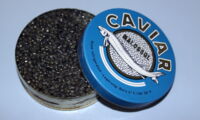
Fake caviar from Bulgaria and Romania
A considerable amount of sturgeon caviar sold in Bulgaria and Romania is mislabeled or even counterfeit. These findings were discovered by scientists from the German Leibniz Institute for Zoo and Wildlife Research (IZW) and the WWF Austria. The results of the market survey have just been published in the scientific journal “Journal of Applied Ichthyology”.
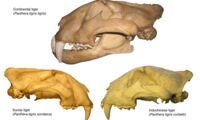
Fewer tiger subspecies – better protection?
New scientific research could help to protect tigers (Panthera tigris) from extinction. The findings indicate that tigers should be classified as only two subspecies – up to now nine subspecies were previously recognized. This will have a significant impact on species conservation since management efforts and breeding programmes can now be organised in a simpler, more flexible and effective way. The results have been published in the scientific open access journal “Science Advances”.
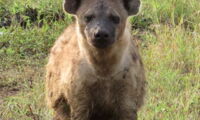
A new method for testosterone determination in spotted hyenas
Innovation in hormone research – A team of researchers from the Leibniz Institute of Zoo and Wildlife Research (IZW) and the University of Pretoria succeeded for the first-time in measuring metabolites of testosterone excreted in the faeces of spotted hyenas. This innovative non-invasive research method is essential to avoid disturbance of animals.
Read more … A new method for testosterone determination in spotted hyenas
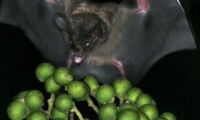
Bats fertilize tropical trees: A win-win situation in the rainforest
Bats in tropical regions are fertilizing trees with their excretions. An international team of scientists recently discovered that seeds of a tropical tree species, which regularly hosts bats in large hollows, contain nutrients from bat excreta. The study has now been published in the scientific journal “Biotropica”.
Read more … Bats fertilize tropical trees: A win-win situation in the rainforest
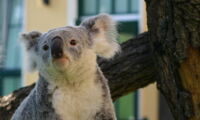
Koalas have a funny diet - do they have funny bacteria?
With their specialized diet of almost exclusively Eucalyptus leaves, do koalas require specialist microbes to help them digest their food? Scientists from the Leibniz Institute for Zoo and Wildlife Research (IZW) investigated the composition of bacterial communities in different digestion-associated organs but found no unusual or special microbial communities when they compared these with those of other mammals. The study also demonstrates that non-invasive samples such as faecal samples commonly used to assess the composition of microbial communities may not provide an accurate account of the host gut microbiome. The study has just been published in the scientific journal “Scientific Reports”.
Read more … Koalas have a funny diet - do they have funny bacteria?
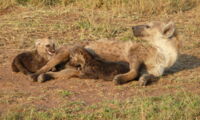
High cost of lactation compromises immune processes in spotted hyenas
Scientists showed that in spotted hyenas lactation increases the chance of parasite infection. The results have been published in the scientific journal “Behavioural Ecology and Sociobiology”.
Read more … High cost of lactation compromises immune processes in spotted hyenas

